education
We fund primary school education, supplement staff salaries, subsidize secondary education, and…
Learn More
clinic
We support a permanent medical clinic, collaborate on a clean water project,…
Learn More
community health
We empower the communities we support to increase their education, health, and…
Learn More
economic development
We provide adult education, resources and local employment to support self-sufficiency.
Learn More
teams
Throughout the year we send medical teams to rural Northern Haiti to…
Learn More
Working Through the Storm
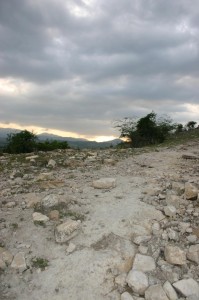 Our November medical team has been working at the Clinic of Hope in northern Haiti as Hurricane Tomas passed by the country this week, bringing lots of rain and wind. The team is safe and continues to see patients. There doesn’t appear to be any damage in the area where the clinic is located, however, there is a lot of flooding in the nearby city of Gonaives.
Our November medical team has been working at the Clinic of Hope in northern Haiti as Hurricane Tomas passed by the country this week, bringing lots of rain and wind. The team is safe and continues to see patients. There doesn’t appear to be any damage in the area where the clinic is located, however, there is a lot of flooding in the nearby city of Gonaives.
The team has also found themselves dealing with the cholera epidemic that has recently developed in Haiti.
Here is a report from Linda Markee, one of the team leaders:
Yesterday (Thursday) was a day of preparation for Hurricane Tomas. The government announced all schools were to be closed Thursday and Friday. (Of course many children in our school – located on the same compound as the clinic – had not gotten the message and there were several hundred at school. They were sent home after lunch.) People bought almost all the rice and beans in Gonaives, so we are thankful that rice for the clinic and the school was purchased last Monday.
Last night we made the clinic ready for the hurricane. We secured the windows and took everything off the roof. Thankfully, one of the team members remembered the solar panels so he and others brought them off the roof also.
When we got up Friday morning there was still no rain, but everyone was waiting. The sky was overcast. A few families came into the school compound to “live.” We did see patients Friday morning and early afternoon. By late afternoon it had started to rain with force! We just stood on the deck over the front entrance to the clinic and could see the road in front of the clinic had turned into a river. Several animals were running by … a goat jumped up into the new waiting area. The two kids playing there finally chased off the goat. You could also hear animals “crying.”
In the midst of all of this we are dealing with the cholera epidemic. When I was home I had the impression from the news that it was subsiding and had not reached Gonaives, but this is not so.
After arriving in Haiti, we were told that the government has a policy that includes all cholera patients in this area be sent to either Gonaives or Gros Morne. They do not want local clinics to keep these patients. The Haitian staff at the Clinic of Hope decided that we Americans were not to take care of the cholera patients. The Haitian workers are screening patients before they enter the clinic and if cholera is suspected they are sent across the street to the church, where Haitian medical staff will see them and give treatment before transporting them to Gonaives or Gros Morne … Needless to say, it is a tough time.
Several team members went to Gros Morne yesterday. There have been a total of 250 cholera patients in their cholera ward, with 5 deaths. The day before they admitted 30 new cases (the largest number in one day). However, the doctor there feels that there are many people far away with cholera who just cannot make it to the clinic and they are dying without getting into the “statistics.”
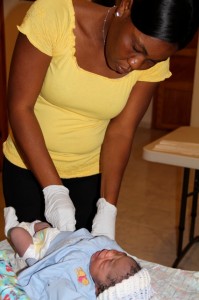 Two volunteer medical teams were working at the Clinic of Hope in February and early March. Thank you to these team members and to those who provide support from home.
Two volunteer medical teams were working at the Clinic of Hope in February and early March. Thank you to these team members and to those who provide support from home.










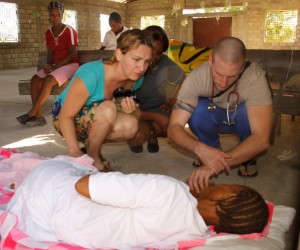 After you have seen it once, the diagnosis of cholera seems possible in the eyes alone. The afflicted stare into the miasma, their eyes literally sunk into their skulls, eyes that portray panic or resignation depending on the progression of the disease. Cholera is horrifying in speed and viciousness, and it is certainly inflicting that fear on the people of Terre Blanche, Haiti.
After you have seen it once, the diagnosis of cholera seems possible in the eyes alone. The afflicted stare into the miasma, their eyes literally sunk into their skulls, eyes that portray panic or resignation depending on the progression of the disease. Cholera is horrifying in speed and viciousness, and it is certainly inflicting that fear on the people of Terre Blanche, Haiti.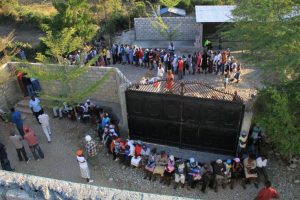
 Our November medical team has been working at the Clinic of Hope in northern Haiti as Hurricane Tomas passed by the country this week, bringing lots of rain and wind. The team is safe and continues to see patients. There doesn’t appear to be any damage in the area where the clinic is located, however, there is a lot of flooding in the nearby city of Gonaives.
Our November medical team has been working at the Clinic of Hope in northern Haiti as Hurricane Tomas passed by the country this week, bringing lots of rain and wind. The team is safe and continues to see patients. There doesn’t appear to be any damage in the area where the clinic is located, however, there is a lot of flooding in the nearby city of Gonaives.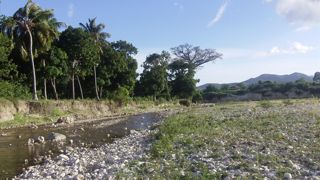 The June medical team has arrived safely in Haiti. Our travels went smoothly and we arrived at the Clinic of Hope on Friday evening in time for a delicious Haitian meal. Saturday was spent setting up the clinic and settling into our home for the next week.
The June medical team has arrived safely in Haiti. Our travels went smoothly and we arrived at the Clinic of Hope on Friday evening in time for a delicious Haitian meal. Saturday was spent setting up the clinic and settling into our home for the next week.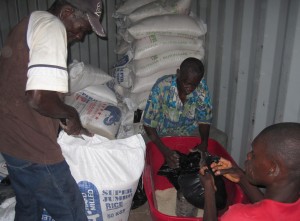 One of our Haitian partners working with the visiting medical team at the Clinic of Hope asked today for prayers for his country. He asked for people to pray for the leadership in Haiti.
One of our Haitian partners working with the visiting medical team at the Clinic of Hope asked today for prayers for his country. He asked for people to pray for the leadership in Haiti.
 Instagram Feed
Instagram Feed

